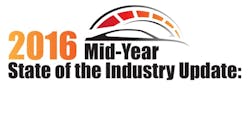2016 Mid-Year State of the Industry Update: Health Insurance and Wages Still Top Concerns
With 2016 well underway, it’s a good time to check in with operators to get a sense of the state of the industry; to see what concerns operators have, what problems they’ve had to overcome and how business in general is going. Across the board most operators reported that they are seeing an increase in business, yet competition from the auto dealers remains one of several concerns for many operators. Overall, 2016 hasn’t been the banner year that operators big and small would like to see.
“We’re not trending like we were last year,” says Ron Morrow, the 2015 National Oil & Lube News Operator of the Year, owner and operator of 17 Grease Monkey franchises and six quick lube/carwash combination stores in Colorado. “We’re flat on the number of cars for the first quarter but our sales are up slightly.”
2016 is an election year, which further brings uncertainly in what remain uncertain times. While businesses have to think about local business, many concerns are on a national level.
“You just don’t know what is going to come up out of Washington,” Morrow adds.
Pumping Up Business
Operators remain divided whether lower gasoline prices translate to consumers being a bit more eager to spend more money to maintain their vehicles — even as many drivers have been putting more miles on their cars this year.
“As long as gas prices stay down we’ll stay busy,” Morrow admits. “It gets tough when gas prices are higher as people don’t drive as much. Consumers do get a bit more conscious about taking care of their cars when they have a bit more money. With the uncertainty, we’re seeing many customers keeping their cars a little longer, putting more care into them rather than buying a new car.”
Some other operators counter that lower prices at the pump aren’t directly increasing business at their shops, however.
“I don’t believe there’s a direct correlation between gas prices and the propensity to ‘invest’ in more maintenance costs,” says Ted Sage, owner of two LOF-Xpress locations in Iowa. “However there is, I believe, a direct correlation between gas prices and the number of miles driven. And with more miles driven, there are more required maintenance costs.”
Phillip Medlen, of Classic Car Care in Bakersfield, California, concurs.
“In central California we have a very large oil industry presence, yet with the current economic climate, money is tight,” he warns.
Still, Medlen is optimistic about the future for his business, suggesting, “our numbers continue to grow because we are fairly new, and we parked our shop next to a carwash that services 1,500-1,700 cars a day.
“We’ve been open just two years, and we’re currently servicing on average 45-50 cars per day and climbing. However, even with oil prices down, the cost of goods (COG) didn’t adjust as we thought it should.”
Medlen further suggests that communication isn’t as it should have been with his suppliers, but says he will seek to remedy that for the rest of 2016.
“We are not a franchise facility,” Medlen notes. “We had partnered with a major supplier, and communication with said supplier is poor at best. There doesn’t seem to be the interest to grow as was the case in the past. I’m now looking to improve the communication.”
Today’s Higher Tech Vehicles
Several operators also report today’s more advanced vehicles, which offer advanced sensors and warning indicators, are actually helping drive some traffic to their shops. Instead of drivers merely “listening” for something to convince them to check it out, the numerous sensors and warning indicators bring awareness to potential problems.
“The alerts are certainly getting people to come to the shop,” says Robert Whiteside, master mechanic at Concord, North Carolina-based SpeeDee Oil Change and Auto Service, and the National Oil & Lube News 2016 Technician of the Year. “In the past there was the check engine light, but today’s sensors offer so much more and are a great indicator of problems.”
Whiteside, who has been a technician for early 30 years, says this not only makes it easier to track down problems, but also enables techs to work on all makes and models. If there is a downside to this technology trend, it is techs at all levels need continuing education to keep up with the changes.
“We’re constantly training on a regular basis,” says Grant Stinchfield, owner and operator of Kwik Kar in Irving, Texas. “That helps us stay abreast of industry trends. The cars are more complicated, and we’ve had to upgrade our equipment just to reset the oil lights.”
One operator suggests too much information might not be the best thing for the shops.
“These systems usually delay the execution time to do just the basic oil change services,” Sage says. “Also, these computerized systems usually end up extending the intervals between oil changes, thus creating a dampening effect on car counts.”
Moreover, these advanced systems enable operators to not only do good work, but help keep customers informed — which translates to repeat business.
“It should be our goal to educate the customers, not just sell them something,” Stinchfield says. “We need to help them make an informed decision on what is happening, so these more advanced systems are really a good thing.”
For the old-school techs, this means occasionally problems are encountered, but due diligence pays off.
“I constantly run into things that surprise me, but I try to keep up with everything that is changing with cars,” Whiteside says. “This sometimes has meant learning from YouTube videos and auto blogs on the Internet.”
Keeping up with technology is a challenge, especially as shops must compete with dealerships — which are also continuing to undercut the indies in other ways.
Benjamin Homan, operator of Pro Lube of America Inc. in Leawook, Kansas, offers that a concern is with “dealerships using free or low-cost services for on-going maintenance on cars they sell. With synthetic oil changes going for $85 to $100 now, people are going to be willing to wait for the dealership to take care of them versus coming to us.”
Obamacare Concerns
Operators almost universally express concerns related to addressing costs associated with running a small business. Even as United Healthcare announced it was pulling out of the Patient Protection and Affordable Care Act — commonly known as Obamacare — which could signal the end to the controversial health care plan, many smaller shops feel the end can’t come soon enough. Many political opponents of Obamacare say it will hurt small business, and shop owners say they are actually feeling it.
“Obamacare equals small business killer,” Sage says. “Ever-increasing government safety net pavements equals worker incentive killer.”
While it is sold as a cheaper way for businesses to provide employees with health care, many shops are arguing that it has done the opposite — with several operators telling National Oil & Lube News it has made insurance more expensive instead.
“Obamacare is simply the worst thing to hit America, and it is really not good for the shop,” Stinchfield says. “Anytime the government mandates what businesses should do it is bad for small business, but Obama care is hurting us really bad.”
Stinchfield says as a small shop with 10 employees it could be enough for him to have to make some hard choices — the kind no shop owner wants to make.
“I can’t afford to pay health insurance for my guys with the margins with have,” Stinchfield admits. “If I have to pay health insurance, someone is sadly going to lose their job, and I’d really hate to see that happen.”
Minimum Wage: The Other Major Concern
Just as Obamacare is seen as a concern for shop owners, so too are the rising costs associated with employee compensation. There is a feeling among many shop owners that a mandatory minimum wage hike could seriously hurt the bottom line — resulting in reduced hours for employees or even a reduced number of employees.
Employee wages are one of Homan’s biggest concerns for 2016, and this shop owner said he is already doing his best to keep prices down for customers. If wages went up he’d face some hard choices.
“I happen to pay my employees more than most, but at the same time, several of my guys have skill sets that probably should demand more per hour than they currently make,” Homan says. “But I can’t afford to pay them much more than I do now. If/when minimum wage gets bumped up to the $15-an-hour range, I’m concerned about losing customers to larger operations that can afford to charge less for their services.”
At the same time, increased labor costs could hurt the most.
“The biggest concern I see is the minimum wage, and that is a big, big factor for our business,” says Colorado-based Morrow. “When they (the government) determine what is overtime hours and move it down from 40 to 30, that is going to really hurt us. People can’t survive on 30 hours a week, and we can’t cut people back — so the bottom line is we’ll have to raise prices, and that hurts the consumer a lot.”
Future Hopes
The consensus from most operators is the second half of 2016 will see an increase in car counts and steady business.
“We are currently trying out a simplified pricing structure compared to what they had previously before I bought the business,” Homan says. “I’m hoping by the end of the year, I’m going to see increased car count, plus increased ticket prices follow the price changes. We offer a great service, and now that we are competitively priced, I’m hoping to see the increased traffic.”
Stinchfield agrees that a big hope is an increased car count, which he adds “is the biggest challenge that faces our business. It starts with good customer service. With everyone so cost conscience people are only looking for best deal.”
About the Author

Peter Suciu
Peter Suciu is Michigan-based writer and NOLN freelance contributor who has contributed to more than four dozen magazines, newspapers and websites. He lives in the land of cars not far from one of Henry Ford's estates.
